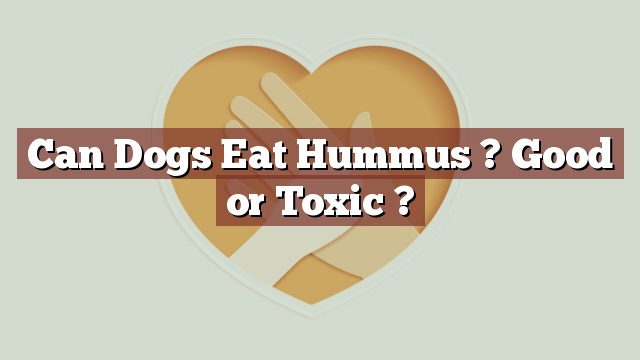Can Dogs Eat Hummus? Good or Toxic?
Can dogs eat hummus? This is a question that many dog owners may have pondered while enjoying this popular Middle Eastern dip. It is essential for pet owners to be aware of the foods that are safe for their furry companions to consume. While hummus is generally safe for human consumption and offers various nutritional benefits, its suitability for dogs is a matter of concern. In this article, we will delve into the nutritional value of hummus, discuss the safety of hummus consumption for dogs, explore the potential risks and benefits of feeding dogs hummus, and provide guidance on what to do if your dog consumes hummus.
Nutritional Value of Hummus: A Detailed Analysis
Hummus is a delicious and nutritious dip made primarily from mashed chickpeas, tahini, olive oil, garlic, and lemon juice. It is a rich source of plant-based protein, fiber, healthy fats, vitamins, and minerals. Chickpeas are packed with essential nutrients like folate, iron, magnesium, and zinc, which contribute to overall health and well-being. The high fiber content in hummus aids in digestion and promotes a healthy gut. Additionally, the healthy fats from tahini and olive oil provide energy and support heart health.
Can Dogs Eat Hummus? Safety of Hummus Consumption for Dogs
Can dogs eat hummus? The answer to this question is no. While hummus contains several beneficial nutrients, it is not suitable for dogs. The main reason is the presence of certain ingredients that can be harmful or toxic to our canine friends. Garlic and onion, commonly used in hummus recipes, are toxic to dogs and can lead to a condition called hemolytic anemia. This condition can cause damage to their red blood cells and potentially be life-threatening. Moreover, the high fat content in hummus can lead to pancreatitis, a severe inflammation of the pancreas in dogs.
Potential Risks and Benefits of Feeding Dogs Hummus
Feeding hummus to dogs can have potential risks and adverse effects on their health. As mentioned earlier, the ingredients in hummus, such as garlic and onion, can be toxic to dogs and should be avoided. Furthermore, the high fat content in hummus can lead to obesity and digestive issues in dogs. It is crucial for dog owners to be aware of these risks and refrain from feeding hummus to their pets.
On the other hand, some dog owners may argue that the nutritional benefits of hummus outweigh the risks. However, it is important to note that dogs have different dietary requirements than humans. While hummus may provide certain nutrients beneficial to humans, there are other dog-friendly foods that can offer similar nutritional value without the associated risks.
What to Do If Your Dog Eats Hummus: Steps to Take
If you suspect that your dog has consumed hummus, it is crucial to take action promptly. First, assess the quantity of hummus ingested and monitor your dog for any signs of distress or discomfort. If your dog has only ingested a small amount of hummus without any visible symptoms, it is advisable to observe them closely for any changes in behavior or health. However, if your dog exhibits signs of illness such as vomiting, diarrhea, abdominal pain, or weakness, it is essential to seek immediate veterinary assistance. A veterinarian will be able to assess the situation and provide appropriate guidance or treatment.
Conclusion: Hummus and Canine Health – The Final Verdict
In conclusion, dogs should not be fed hummus due to its potential risks and toxicity. While hummus offers several nutritional benefits to humans, the presence of ingredients like garlic and onion makes it unsafe for dogs. Feeding hummus to dogs can lead to serious health issues such as hemolytic anemia and pancreatitis. It is vital for dog owners to be aware of the foods that are safe for their pets and to consult with a veterinarian regarding their dietary needs. By providing a balanced diet tailored to their specific requirements, we can ensure the health and well-being of our beloved canine companions.
Thank you for investing your time in exploring [page_title] on Can-Eat.org. Our goal is to provide readers like you with thorough and reliable information about various dietary topics. Each article, including [page_title], stems from diligent research and a passion for understanding the nuances of our food choices. We believe that knowledge is a vital step towards making informed and healthy decisions. However, while "[page_title]" sheds light on its specific topic, it's crucial to remember that everyone's body reacts differently to foods and dietary changes. What might be beneficial for one person could have different effects on another. Before you consider integrating suggestions or insights from "[page_title]" into your diet, it's always wise to consult with a nutritionist or healthcare professional. Their specialized knowledge ensures that you're making choices best suited to your individual health needs. As you navigate [page_title], be mindful of potential allergies, intolerances, or unique dietary requirements you may have. No singular article can capture the vast diversity of human health, and individualized guidance is invaluable. The content provided in [page_title] serves as a general guide. It is not, by any means, a substitute for personalized medical or nutritional advice. Your health should always be the top priority, and professional guidance is the best path forward. In your journey towards a balanced and nutritious lifestyle, we hope that [page_title] serves as a helpful stepping stone. Remember, informed decisions lead to healthier outcomes. Thank you for trusting Can-Eat.org. Continue exploring, learning, and prioritizing your health. Cheers to a well-informed and healthier future!

